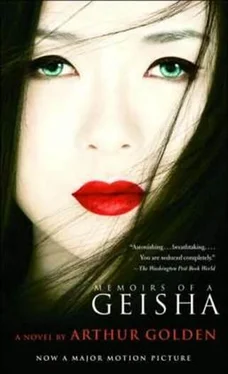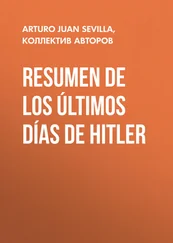Mameha leaned across in front of the Chairman and whispered to me, “What the Chairman is really saying is that he doesn’t particularly like sumo.”
“Now, Mameha,” he said, “if you’re trying to get me into trouble with Nobu…”
“Chairman, Nobu-san has known for years how you feel!”
“Nevertheless. Sayuri, is this your first encounter with sumo?”
I’d been waiting for some excuse to speak with him; but before I’d so much as taken a breath, we were all startled by a tremendous boom that shook the great building. Our heads turned and the crowd fell silent; but it was nothing more than the closing of one of the giant doors. In a moment we could hear hinges creaking and saw the second door straining its way around in an arc, pushed by two of the wrestlers. Nobu had his head turned away from me; I couldn’t resist peering at the terrible burns on the side of his face and his neck, and at his ear, which was misshapen. Then I saw that the sleeve of his jacket was empty. I’d been so preoccupied, I hadn’t noticed it earlier; it was folded in two and fastened to his shoulder by a long silver pin.
I may as well tell you, if you don’t know it already, that as a young lieutenant in the Japanese marines, Nobu had been severely injured in a bombing outside Seoul in 1910, at the time Korea was being annexed to Japan. I knew nothing about his heroism when I met him-though in fact, the story was familiar all over Japan. If he’d never joined up with the Chairman and eventually become president of Iwamura Electric, probably he would have been forgotten as a war hero. But as it was, his terrible injuries made the story of his success that much more remarkable, so the two were often mentioned together.
I don’t know too much about history-for they taught us only arts at the little school-but I think the Japanese government gained control over Korea at the end of the Russo-Japanese War, and a few years afterward made the decision to incorporate Korea into the growing empire. I’m sure the Koreans didn’t much like this. Nobu went there as part of a small force to keep things under control. Late one afternoon he accompanied his commanding officer on a visit to a village near Seoul. On the way back to the spot where their horses were tied up, the members of the patrol came under attack. When they heard the horrible shrieking noise of an incoming shell, the commanding officer tried to climb down into a ditch, but he was an old man and moved at about the speed of a barnacle inching its way down a rock. Moments before the shell struck he was still trying to find a foothold. Nobu laid himself over the commanding officer in an effort to save him, but the old man took this badly and tried to climb out. With some effort he raised his head; Nobu tried to push it back down, but the shell struck, killing the commanding officer and injuring Nobu severely. In surgery later that year, Nobu lost his left arm above the elbow.
The first time I saw his pinned sleeve, I couldn’t help averting my eyes in alarm. I’d never before seen anyone who’d lost a limb-though when I was a little girl, an assistant of Mr. Tanaka’s had lost the tip of his finger one morning while cleaning a fish. In Nobu’s case, many people felt his arm to be the least of his problems, because his skin was like an enormous wound. It’s hard to describe the way he looked, and probably it would be cruel for me even to try. I’ll just repeat what I overheard another geisha say about him once: “Every time I look at his face, I think of a sweet potato that has blistered in the fire.”
When the huge doors were closed, I turned back to the Chairman to answer his question. As an apprentice I was free to sit as quietly as an arrangement of flowers, if I wanted to; but I was determined not to let this opportunity pass. Even if I made only the slightest impression on him, like a child’s foot might make on a dusty floor, at least it would be a start.
“The Chairman asked if this is my first encounter with sumo,” I said. “It is, and I would be very grateful for anything the Chairman might be kind enough to explain to me.”
“If you want to know what’s going on,” said Nobu, “you’d better talk to me. What is your name, apprentice? I couldn’t hear well with the noise of the crowd.”
I turned away from the Chairman with as much difficulty as a hungry child turns away from a plate of food.
“My name is Sayuri, sir,” I said.
“You’re Mameha’s younger sister; why aren’t you ‘Mame’ something-or-other?” Nobu went on. “Isn’t that one of your foolish traditions?”
“Yes, sir. But all the names with ‘Mame’ turned out to be inauspicious for me, according to the fortune-teller.”
“The fortune-teller,” Nobu said with contempt. “Is he the one who picked your name for you?”
“I’m the one who picked it,” Mameha said. “The fortune-teller doesn’t pick names; he only tells us if they’re acceptable.”
“One day, Mameha,” Nobu replied, “you’ll grow up and stop listening to fools.”
“Now, now, Nobu-san,” said the Chairman, “anyone hearing you talk would think you’re the most modern man in the nation. Yet I’ve never known anyone who believes more strongly in destiny than you do.”
“Every man has his destiny. But who needs to go to a fortune-teller to find it? Do I go to a chef to find out if I’m hungry?” Nobu said. “Anyway, Sayuri is a very pretty name-though pretty names and pretty girls don’t always go together.”
I was beginning to wonder if his next comment would be something like, “What an ugly younger sister you’ve taken on, Mameha!” or some such thing. But to my relief, he said:
“Here’s a case where the name and the girl go together. I believe she may be even prettier than you, Mameha!”
“Nobu-san! No woman likes to hear that she isn’t the prettiest creature around.”
“Especially you, eh? Well, you’d better get used to it. She has especially beautiful eyes. Turn toward me, Sayuri, so I can have another look at them.”
I couldn’t very well look down at the mats, since Nobu wanted to see my eyes. Nor could I stare directly back at him without seeming too forward. So after my gaze slipped around a little, like trying to find a footing on ice, I finally let it settle in the region of his chin. If I could have willed my eyes to stop seeing, I would certainly have done it; because Nobu’s features looked like poorly sculpted clay. You must remember that I knew nothing as yet about the tragedy that had disfigured him. When I wondered what had happened to him, I couldn’t stop that terrible feeling of heaviness.
“Your eyes certainly do shimmer in a most startling way,” he said.
At that moment a small door opened along the outside of the hall, and a man entered wearing an exceptionally formal kimono with a high black cap on his head, looking as if he’d stepped directly out of a painting of the Imperial court. He made his way down the aisle, leading a procession of wrestlers so huge they had to crouch to pass through the doorway.
“What do you know about sumo, young girl?” Nobu asked me.
“Only that the wrestlers are as big as whales, sir,” I said. “There’s a man working in Gion who was once a sumo wrestler.”
“You must mean Awajiumi. He’s sitting just over there, you know.” With his one hand, Nobu pointed toward another tier where Awajiumi sat, laughing about something, with Korin next to him. She must have spotted me, for she gave a little smile and then leaned in to say something to Awajiumi, who looked in our direction.
“He was never much of a wrestler,” Nobu said. “He liked to slam his opponents with his shoulder. It never worked, stupid man, but it broke his collarbone plenty of times.”
Читать дальше












